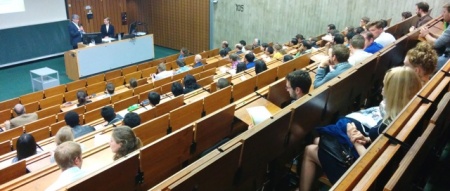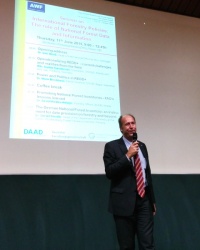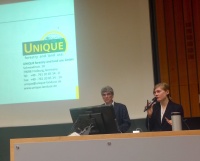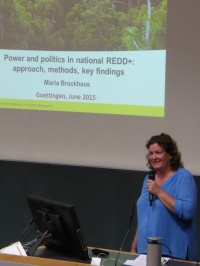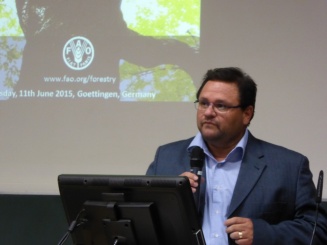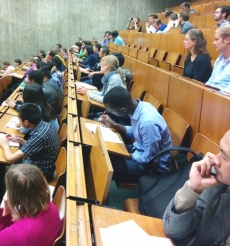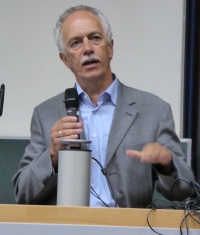DAAD World Forestry Congress Workshop
Contents
|
Background
Our next DAAD funded workshop will take place along the World Forestry Congress in Durban and Pietermaritzburg, South Africa. Thanks to the funding of DAAD, we are now looking back to a series of very successful student and alumni workshops that bring together DAAD funded international students from our international Master program (TIF) and professionals and alumni from all over the world. For more background information on prior workshops in this series we refer to the Category:DAAD workshops.
For the first time the World Forestry Congress will be hosted in Africa to bring together the global forestry community to review and analyze the key issues and to share ways of addressing them. The policy processes to implement the measures in these conventions on sub-national, national, regional and international level are extremely complex. And that complexity comes, among other factors, from a blend of different sectoral and national interests, from a large number of scientifically not yet entirely resolved issues and a wide range of different biophysical, social, cultural and political conditions all over the world. It is a challenge for academia to educate the future decision makers (who are our students today) in a way that they are enthusiastic about the overall relevance of these processes – but also about the many details that are to be worked on. And it is a challenge to integrate this education into regular curricula because various dimensions need to be covered in a field that is rapidly further developing. On the other hand, these processes offer a unique possibility to illustrate the important – and sometimes somewhat neglected – science-policy interface. The Faculty of Forest Sciences and Forest Ecology started in 2010 to implement a new format of what we would call “long-term / sustainable national capacity building”. Along the World Forestry Congress we organize the workshop “Bridging the gap between forest information needs and forest inventory capacity –challenges for academia and governments in Africa regarding national forest monitoring and assessment” for master-students and professors from partner universities (alumni of German universities).
Guest lectures
The program for our workshop is divided in two parts. Before we meet on our workshop in South Africa there will be an introductory seminar with guest lectures held at the University of Göttingen. These presentations gave an introduction to the role of International Forestry Policies and the role of National Forest Data and Information. During the lectures more than 80 interested Professors, scietific staff and students participated. We were happy about the high level speakers. PLesae find the presentations for your information below.
Introduction seminar papers (11.06.2015, Zentrales Hörsaalgebäude (ZHG), University od Göttingen, Room 105)
The Seminar will be on Thursday, 11th June 2015 from 9:00 till 12:30 in Zentrales Hörsaalgebäude (ZHG). The seminar is open for public. Download Program
09:00 - 09:45 Operationalizing REDD+ - current challenges and realities from the field
MSc Sophia Carodenuto, Consultant, UNIQUE forestry and land use
Ms Carodenuto works on international forestry and climate policies and its implementation focusing on REDD+ and FLEGT.
09:45 - 10:30 Power and Politics in REDD+
Dr. Maria Brockhaus, Senior Scientist, CIFOR
Dr. Brockhaus is a senior scientist with the CIFOR's Forests and Governance program, focusing mainly on policy and institutional change and policy and social network analysis.
10:30 - 11:00 Coffe break
11:00 - 11:45 Promoting National Forest Inventories in Africa, FAO's lessons learned
Dr. David Morales-Hidalgo, Forestry Officer, UN-FAO
Dr. Morales supports FAO activities on National Forest Monitoring and Assessment, providing capacity building on planning, set-up and implementing national forest monitoring systems to member countries.
11:45 - 12:30 The German National Forest Inventory: an instrument for data provision on forestry and beyond
Dr. Gerald Kändler, Head of the Department of Biometry at the Baden-Württemberg Forest Research Institute, Freiburg
Among other duties, Dr. Kändler is responsible for the implementation and analysis of the German NFI in the Federal State of Baden-Württemberg.
Preliminary Workshop Program (September 2015, Durban and Pietermaritzburg)
Please observe that the program is preliminary and will be fixed during the next weeks!
Last program update: 26.08.2015
DAAD World Forestry Congress Workshop program
DAY ONE; 7 September 2015
06:00 - 18:00: Participation at World Forestry Congress
DAY TWO; 8 September 2015
06:00 - 18:00: Participation at World Forestry Congress
DAY THREE; 9 September 2015
Moderation and Minutes: Adam Abubakari and Nicolás Mesía Rojas
08:30 - 09:00: Welcome and Opening Address
09:15 - 09:30: Introductory words, Prof. Dr. Christoph Kleinn
09:30 - 09:50: Forests in South Africa, Cori Ham
Session 1 - Policy
Moderation and Minutes: Anton Kunnecke and Otto Pienaar
09:50 - 10:10: Who needs forest information and why?, Dr. Cornelis van Tuyll
10:10 - 10:30: Stakeholders and state of forest resources in Zomba-Malosa Forest Reserve, Dr. Gerlad Meke
10:30 - 10:50: Implications of the State Policies related to the watershed management in the conservation and sustainable use of forests: the case of Bangladesh and Guatemala, Sohag Miah, Pedro Daniel Pardo Villegas
10:50 - 11:10: Community based conservation: Approaches, Successesand Challenges in Namibia and Nepal, Miya Kabajani, Anu Singh
11:10 - 11:40 Break
Session 2 - REDD
Moderation and Minutes: Daniel Conceicao dos Santos and Aung Myint Myat
11:40 - 12:00: Evaluation of carbon accounting models for timber plantations in KwaZulu-Natal, South Africa, Cori Ham
12:00 - 12:20: Stand level biomass models and its use in forest monitoring: an example for Peat Swamp Forests in Indonesia , Dr. César Pérez
12:20 - 12:40: The curse of rare events, or why results based payments might fail in REDD. - A forest monitoring case study from Colombia -, Dr. Paul Magdon
12:40 - 13:00: Carbon from plantations: opportunities and constraints, Cori Ham, Sabine Schreiner, Jeanne-Lazya Roux
13:00 - 14:40: Break
Session 3 – Summarizing World Forestry Congress visit
Moderation and Minutes: Abraha Hatsey and Jeanne Lazya Roux
14:40 - 16:40: Presentation of Minutes during the World Forestry Congress participants, ALL
16:40 - 17:10: Break
17:10 - 19:00: Group work sessions
DAY FOUR, 10 September 2015
Field trip – NCT Enon plantation
Minutes: Sohag Miah and Pedro Daniel Pardo Villegas
08:00 - 09:00: Drive to NCT Enon plantation
09:00 - 09:30: Introduction to NCT Enon plantation
09:30 - 10:00: Brief discussion about forestry carbon at Enon
10:00 - 12:30: Tour of plantation operations and visit to indigenous forest
Field trip – Tala Game reserve
Minutes: Adam Abubakari and Nicolás Mesía Rojas
12:30 - 15:00: Break and drive to Tala game reserve
15:00 - 17:00: Visit of Tala game reserve
DAY FIVE; 11 September 2015
Session 4 – Monitoring
Moderation and Minutes: Erick Mbingwani and Jie Zang
09:00 - 09:20: A unified framework for environmental monitoring based on a discrete global sampling grid system, Dr. Lutz Fehrmann
09:20 - 09:40: Assessing the monitoring systems and solutions of Deforestation in Brazilian Amazon rainforest, Daniel Conceicao dos Santos, Aung Myint Myat
09:40 - 10:00: Developing monitoring tools for ecological restoration in the Atlantic Forest of Brazil, Juliana Bustamante, Rozyia Kirgizbekova
10:00 - 10:20: Scale-dependent stand heterogeneity in a near-natural, mature, mixed decidous forest, Collins Kukunda
10:20 - 10:50: Break
Session 5 – Remote Sensing
Moderation and Minutes: Collins Kukunda and Nils Nölke
10:50 - 11:10: Can remote sensing support forest management in China? A case study from Shitai county, Anhui Province, Dr. Hans Fuchs
11:10 - 11:30: Can thermal imaging support the determination of the age of bamboo culms? A case study from Pereira, Colombia, Nils Nölke
11:30 - 11:50: Evaluating UAV aerial surveying benefits to ground inventory in an indigenous forest in South Africa, Anton Kunnecke, Otto Pienaar
11:50 - 13:30: Break
Session 6 – Forest Management
Moderation and Minutes: Abraha Hatsey, Miya Kabajani and Anu Singh
13:30 - 13:50: Utilizing multi-source data for Sustainable Forest Management in Indonesia, Prof. Dr. I Nengah Surati Jaya
13:50 - 14:10: Towards estimation of growing stock for the timber tree Pterocarpus angolensis in Namibia, Vera De Cauwer
14:10 - 14:30: The role of sacred forests in conserving tree species diversity--a case study in Malawi, Erick Mbingwani, Jie Zang
14:30 - 14:50: Trends of forest cover change in Ethiopia, Abraha Hatsey
15:10 - 15:30: Challenges for the management of tropical forest in the context of climate change: The case of Amazonian Forest in Peru and Congo Basin in Democratic Republic of Congo, Adam Abubakari, Nicolás Mesía Rojas
15:30 - 16:00: Break
16:00 - 19:00: Group work sessions
DAY SIX; 12 September 2015
Workshop closing
Moderation and Minutes: Sohag Miah and Pedro Daniel Pardo Villegas
09:30 - 10:30: Evaluation
10:30 - 11:00: Break
11:00 - 12:00: Workshop wrap-up
12:00 - 14:00: Break
14:00 - 14:30: Workshop closing
14:30 - 18:30: Group work sessions
Workshop venue
The workshop will take place in the Ascot Bush Lodge in Pietermaritzburg.
